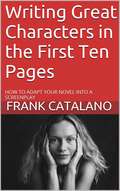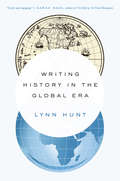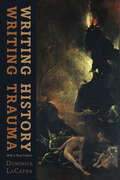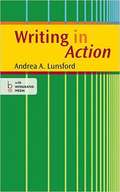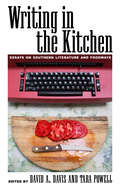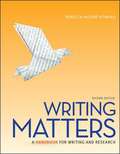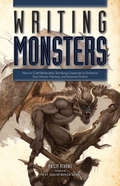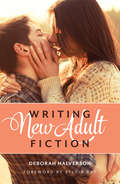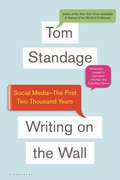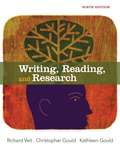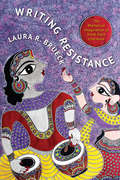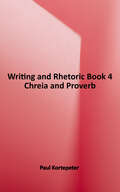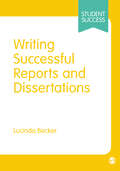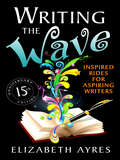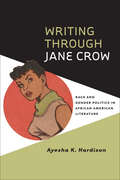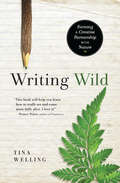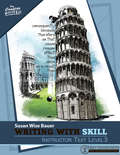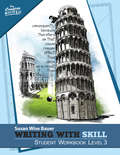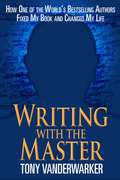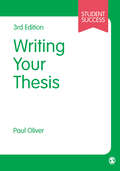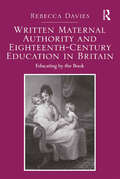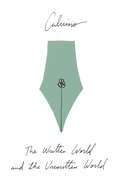- Table View
- List View
Writing Great Characters in the First Ten Pages: How to Adapt Your Novel Into a Screenplay
by Frank CatalanoWriters of fiction and non-fiction and industry professionals from the publishing business primarily attended the 25th Annual Writer's Conference. Mr. Catalano's seminars focused upon those writers seeking to adapt their novels into screenplays. The complete list of seminar presentations by Frank Catalano for this conference is: BOOK 1: WRITE GREAT CHARACTACTERS IN THE FIRST TEN PAGES BOOK 2: WRITING ON YOUR FEET - IMPROVISATIONAL TECHNIQUES FOR WRITERS BOOK 3: START YOUR STORY AT THE END: FOR WRITERS BOOK 4: THE FIRST TEN PAGES BOOK 5: BOOK TO SCREEN BOOK 6: ACTING IT OUT - IMPROVISATIOINAL TECHNIQUES FOR WRITERS II BOOK 7: WRITE GREAT DIALOGUE
Writing History in the Global Era
by Lynn HuntLeading historian Lynn Hunt rethinks why history matters in today's global world and how it should be written. George Orwell wrote that "history is written by the winners." Even if that seems a bit too cut-and-dried, we can say that history is always written from a viewpoint but that viewpoints change, sometimes radically. The history of workers, women, and minorities challenged the once-unquestioned dominance of the tales of great leaders and military victories. Then, cultural studies--including feminism and queer studies--brought fresh perspectives, but those too have run their course. With globalization emerging as a major economic, cultural, and political force, Lynn Hunt examines whether it can reinvigorate the telling of history. She hopes that scholars from East and West can collaborate in new ways and write wider-ranging works. At the same time, Hunt argues that we could better understand the effects of globalization in the past if we knew more about how individuals felt about the changes they were experiencing. She proposes a sweeping reevaluation of individuals' active role and their place in society as the keys to understanding the way people and ideas interact. She also reveals how surprising new perspectives on society and the self--from environmental history, the history of human-animal interactions, and even neuroscience--offer promising new ways of thinking about the meaning and purpose of history in our time.
Writing History, Writing Trauma (Parallax: Re-visions of Culture and Society)
by Dominick LaCapraAn updated edition of a major work in trauma studies.Trauma and its aftermath pose acute problems for historical representation and understanding. In Writing History, Writing Trauma, Dominick LaCapra critically analyzes attempts by theorists and literary critics to come to terms with trauma and with the crucial role post-traumatic testimonies—notably Holocaust testimonies—assume in thought and in writing. These attempts are addressed in a series of six interlocking essays that adapt psychoanalytic concepts to historical analysis, while employing sociocultural and political critique to elucidate trauma and its aftereffects in culture and in people. This updated edition includes a substantive new preface that reconsiders some of the issues raised in the book.
Writing In Action
by Andrea A. LunsfordAndrea Lunsford’s research treats student writers as writers first—not only in the classroom, but in every aspect of their lives. Her newest handbook features a simple and inviting design that helps students find solutions for every situation as they translate their skills as writers in their day-to-day lives to the conventions of solid academic writing. Featuring the writing process coverage of larger handbooks at a value price, Writing in Action is a supportive reference that emphasizes rhetorical strategies that help students put their ideas into action.
Writing in the Kitchen: Essays on Southern Literature and Foodways
by Clayton BrumbyScarlett O'Hara munched on a radish and vowed never to go hungry again. Vardaman Bundren ate bananas in Faulkner's Jefferson, and the Invisible Man dined on a sweet potato in Harlem. Although food and stories may be two of the most prominent cultural products associated with the South, the connections between them have not been thoroughly explored until now. Southern food has become the subject of increasingly self-conscious intellectual consideration. The Southern Foodways Alliance, the Southern Food and Beverage Museum, food-themed issues of Oxford American and Southern Cultures, and a spate of new scholarly and popular books demonstrate this interest. Writing in the Kitchen explores the relationship between food and literature and makes a major contribution to the study of both southern literature and of southern foodways and culture more widely. This collection examines food writing in a range of literary expressions, including cookbooks, agricultural journals, novels, stories, and poems. Contributors interpret how authors use food to explore the changing South, considering the ways race, ethnicity, class, gender, and region affect how and what people eat. They describe foods from specific southern places such as New Orleans and Appalachia, engage both the historical and contemporary South, and study the food traditions of ethnicities as they manifest through the written word.
Writing Metamorphosis in the English Renaissance
by Susan WisemanTaking Ovid's Metamorphoses as its starting point, this book analyses fantastic creatures including werewolves, bear-children and dragons in English literature from the Reformation to the late seventeenth century. Susan Wiseman tracks the idea of transformation through classical, literary, sacred, physiological, folkloric and ethnographic texts. Under modern disciplinary protocols these areas of writing are kept apart, but this study shows that in the Renaissance they were woven together by shared resources, frames of knowledge and readers. Drawing on a rich collection of critical and historical studies and key philosophical texts including Descartes' Meditations, Wiseman outlines the importance of metamorphosis as a significant literary mode. Her examples range from canonical literature, including Shakespeare's A Midsummer Night's Dream and The Tempest, to Thomas Browne on dragons, together with popular material, arguing that the seventeenth century is marked by concentration on the potential of the human, and the world, to change or be changed.
Writing Monsters: How to Craft Believably Terrifying Creatures to Enhance Your Horror, Fantasy, an d Science Fiction
by Philip AthansMonsters are more than things that go bump in the night... Monsters are lurking in the woods, beneath the waves, and within our favorite books, films, and games--and there are good reasons why they appear so often. Monsters are manifestations of our fears and symbols of our society--not to mention they're a lot of fun--but each should serve a purpose and enhance the themes and tension in your fiction. In Writing Monsters, best-selling author Philip Athans uses classic examples from books, films, and the world around us to explore what makes monsters memorable--and terrifying. You'll learn what monsters can (and should) represent in your story and how to create monsters from the ground up. Writing Monsters includes: In-depth discussions of where monsters come from, what they symbolize, and how to best portray them in fiction Informative overviews of famous monsters, archetypes, and legendary creatures A Monster Creation Form to help you create your monster from scratch An annotated version of H.P. Lovecraft's chilling story "The Unnamable" Whether you write fantasy, science fiction, or horror, your vampires, ghouls, aliens, and trolls need to be both compelling and meaningful. With Writing Monsters, you can craft creatures that will wreak havoc in your stories and haunt your readers' imaginations--and nightmares.
Writing New Adult Fiction: How to Write and Sell New-Adult Fiction
by Deborah HalversonJoin the New Adult Fiction revolution! From Sylvia Day's Bared to You to Jamie McGuire's Beautiful Disaster, new adult fiction has arrived--and it's hotter than ever. But there's more to this category than its 18-to-26-year-old characters: The success of your story depends on authentically depicting the transition of your young protagonists from teenhood to adulthood. With Writing New Adult Fiction, you'll learn how to capture the spirit of freedom, self-discovery, and romance that defines the new adult experience. Create memorable characters that act and sound like new adults. Sculpt a distinct personality for your fiction with POV, voice, tone, and word choices. Build a unique, captivating plot that satisfies your audience from beginning to end. Learn tools for revising effectively and efficiently in a speed-driven market. Weigh the options for your path to publication: traditional, indie, and hybrid. The new adult category is filled with opportunities to break in with distinct plots and original characters. Make your mark by writing a novel that's fresh, unique--and wholly new adult!
Writing on the Wall: Social Media--The First 2,000 Years
by Tom StandageThe Catholic Church's dilemmas in responding to Martin Luther's attacks are similar to those of today's large institutions in responding to criticism on the Internet, for example, and seventeenth-century complaints about the distractions of coffeehouses mirror modern concerns about social media. Invoking figures from Thomas Paine to Vinton Cerf, co-inventor of the Internet, Standage explores themes that have long been debated, from the tension between freedom of expression and censorship to social media's role in spurring innovation and fomenting revolution.
Writing, Reading, and Research (9th Edition)
by Richard Veit Christopher Gould Kathleen GouldThis text is a composition course that prepares students for the tasks they will face during their college and professional careers developing skills in writing, reading and analyzing information.
Writing Resistance: The Rhetorical Imagination of Hindi Dalit Literature (South Asia Across the Disciplines)
by Laura BrueckWriting Resistance is the first close study of the growing body of contemporary Hindi-language Dalit (low caste) literature in India. The Dalit literary movement has had an immense sociopolitical and literary impact on various Indian linguistic regions, yet few scholars have attempted to situate the form within contemporary critical frameworks. Laura R. Brueck's approach goes beyond recognizing and celebrating the subaltern speaking, emphasizing the sociopolitical perspectives and literary strategies of a range of contemporary Dalit writers working in Hindi.Brueck explores several essential questions: what makes Dalit literature Dalit? What makes it good? Why is this genre important, and where does it oppose or intersect with other bodies of Indian literature? She follows the debate among Dalit writers as they establish a specifically Dalit literary critical approach, underscoring the significance of the Dalit literary sphere as a "counterpublic" generating contemporary Dalit social and political identities. Brueck then performs close readings of contemporary Hindi Dalit literary prose narratives, focusing on the aesthetic and stylistic strategies deployed by writers whose class, gender, and geographic backgrounds shape their distinct voices. By reading Dalit literature as literature, this study unravels the complexities of its sociopolitical and identity-based origins.
Writing & Rhetoric Book 4: Chreia & Proverb
by Paul KortepeterThe Writing and Rhetoric series method employs fluent reading, careful listening, models for imitation, and progressive steps. It assumes that students learn best by reading excellent, whole-story examples of literature and by growing their skills through imitation. Each exercise is intended to impart a skill (or tool) that can be employed in all kinds of writing and speaking. The exercises are arranged from simple to more complex. What's more, the exercises are cumulative, meaning that later exercises incorporate the skills acquired in preceding exercises. This series is a step-by-step apprenticeship in the art of writing and rhetoric.
Writing Successful Reports and Dissertations (Student Success)
by Lucinda BeckerAre you unsure what your report should look like or how you’ll ever finish it in time? Are you freaking out about starting on an extended piece of writing? Help is here! In this handy little book, you’ll find expert guidance to enable you to produce a successful report or dissertation. With a focus on developing an effective writing style and argument, this book shows you, step-by-step, how to plan and deliver a perfect piece of writing to gain top marks. Open up to find advice on: What makes dissertations and reports distinctive Organising your time and materials Finding the right planning method for you How to structure your writing successfully Writing good sentences, paragraphs, sections and chapters. Read this book and you’re on your way to writing a great report or dissertation! The Student Success series are essential guides for students of all levels. From how to think critically and write great essays to planning your dream career, the Student Success series helps you study smarter and get the best from your time at university. Visit the SAGE Study Skills hub for tips and resources for study success!
Writing the Wave: Inspired Rides for Aspiring Writers
by Elizabeth AyresWhere's your wave of creativity? If you want to learn how to write, "Writing the Wave: Inspired Rides for Aspiring Writers" is the very first writing book designed especially for beginning writers who yearn to write more expressively. Written with warmth and wit by internationally acclaimed writer and teacher Elizabeth Ayres, this 15th anniversary edition of a classic writing how-to book makes the creative process safe, easy and fun while honoring its spiritual depth and mystery. Elizabeth shows you how it's done. With step-by-step instructions and easy-to-follow writing exercises, you'll be writing non-stop from the very first page, even if you've never written before. It's just like having a personal writing coach. You can learn how to be a writer. Throw away those endless lists of writing prompts. Learn how to discover your own ideas with these break-through writing exercises that transform fundamental writing principles into concrete writing techniques you can use over and over, forever, whether you want to learn how to write fiction, nonfiction, poetry -- or something that doesn't even have a name yet. Unlike other writing books, "Writing the Wave" couples inspiring writing exercises with expert and compassionate advice, to minimize the fears and maximize the joys of writing. And more advanced writers looking for a jumpstart will appreciate recovering their free-flowing creative wellspring. There's a vast ocean of inspiration within you. The surf's up! The water's warm! Are you ready to take the plunge? "Elizabeth Ayres has thought long and hard about the writing process, and is one of the most seasoned and exemplary practitioners in the field of teaching writing. This book about writing is an invaluable distillation of her insights and experiences. I cannot imagine any beginning or struggling writer not coming away with some inspiration from it." (Phillip Lopate, editor of "The Art of Writing" and "Writing New York")
Writing through Jane Crow: Race and Gender Politics in African American Literature
by Ayesha K. HardisonIn Writing through Jane Crow, Ayesha Hardison examines African American literature and its representation of black women during the pivotal but frequently overlooked decades of the 1940s and 1950s. At the height of Jim Crow racial segregation—a time of transition between the Harlem Renaissance and the Black Arts movement and between World War II and the modern civil rights movement—black writers also addressed the effects of "Jane Crow," the interconnected racial, gender, and sexual oppression that black women experienced. Hardison maps the contours of this literary moment with the understudied works of well-known writers like Gwendolyn Brooks, Zora Neale Hurston, Ann Petry, and Richard Wright as well as the writings of neglected figures like Curtis Lucas, Pauli Murray, and Era Bell Thompson.By shifting her focus from the canonical works of male writers who dominated the period, the author recovers the work of black women writers. Hardison shows how their texts anticipated the renaissance of black women’s writing in later decades and initiates new conversations on the representation of women in texts by black male writers. She draws on a rich collection of memoirs, music, etiquette guides, and comics to further reveal the texture and tensions of the era.A 2014 CHOICE Outstanding Academic Title
Writing Wild
by Tina WellingAlign Your Creative Energy with Nature's "Everything we know about creating," writes Tina Welling, "we know intuitively from the natural world." In Writing Wild, Welling details a three-step "Spirit Walk" process for inviting nature to enliven and inspire our creativity.
Writing With Skill, Level 3: Instructor Text (Vol. 3) (The Complete Writer)
by Susan Wise BauerThe third volume of the groundbreaking writing series that prepares students for high-level work in rhetoric and composition. Full support for parents and teachers, including rubrics, model compositions, teaching tips, and suggested dialogue. Building on the first two levels of Writing With Skill, Level 3 reinforces skills in original composition and introduces new skills in researching, organizing, and writing expository essays. This third level is marked by a focus on writing about cause and effect, as well as more advanced instruction in literary criticism, science writing, descriptions, and paragraph construction. Time-tested classical techniques--the imitation and analysis of great writers--combine with original composition exercises in history, science, biography, and literature. Along with the Student Workbook, this Level Three Instructor Text provides a complete year of advanced middle-grade writing instruction.
Writing With Skill, Level 3: Student Workbook (The Complete Writer)
by Susan Wise BauerThis third volume of the groundbreaking writing series prepares students for advanced work in rhetoric and composition. Straightforward, detailed instructions lead students through brainstorming, researching, and constructing original compositions. Building on the first two levels of Writing With Skill, Level 3 reinforces skills in original composition and introduces new skills in researching, organizing, and writing expository essays. Models from great writers provide inspiration; assignments in history, science, biography and literature expand the student's horizons. This third level is marked by a focus on writing about cause and effect, as well as more advanced instruction in literary criticism, science writing, descriptions, and paragraph construction. Time-tested classical techniques--the imitation and analysis of great writers--combine with original essay assignments. Along with the accompanying Instructor Guide, this Level Three Student Workbook provides a complete year of advanced middle-grade writing instruction.
Writing with the Master: How One of the World?s Bestselling Authors Fixed My Book and Changed My Life
by Tony VanderwarkerWith seven unpublished novels wasting away on his hard drive, Tony Vanderwarker is astonished when John Grisham offers to take him under his wing and teach him the secrets of thriller writing. "The beginning and the end are easy," Grisham tells him. "It's the three hundred pages in the middle that's the hard part."To ensure his plot doesn't run out of gas, Grisham puts Tony though his outline process. Tony does one, and then Grisham asks for another ... and another ... and another. As they work together, Grisham reveals the techniques that have helped him create compelling bestsellers for more than two decades-for instance, "You've got to hook your reader in the first forty pages or you'll lose them." After a year of constructing outlines, Grisham finally gives Tony the go-ahead to start writing.Writing with the Master immerses the reader in the creative process as Tony struggles to produce a successful thriller. It's a roller coaster ride, sometimes hilarious, and often full of ups and downs. Grisham's critiques and margin notes to Tony reveal his nimble imagination and plot development genius. For Grisham fans, Vanderwarker's memoir pulls back the curtain on his writing secrets, and for aspiring writers, it's a master class in thriller writing.In the end, Tony resolves to take Grisham's teachings to heart and eventually decides to write what he thinks he was meant to: a book about the creative process and his incredible two years working with John Grisham.
Writing Your Thesis (Student Success)
by Paul Oliver′Written in an authoritative and accessible style, this is a must-read for anyone planning, researching and writing a doctoral thesis or dissertation. I will certainly be recommending this book to my research students.′ - Professor Goeffrey Elliott, University of Worcester ′Paul′s book was a lifeline during my doctorate: it is now the first book that I recommend for my research students! His book is easily accessible, full of practical advice, and provides useful study strategies to carefully guide you - this third edition is a valuable asset wherever you are on your doctoral journey.′ - Dr Scott Buckler, University of Worcester Based on his extensive experience as a successful thesis supervisor, Paul Oliver shows you how to turn your notes and data into a finished Masters or PhD thesis or dissertation. Fully up-to-date with current HEFCE/other EU requirements, the book sets out a template for you to follow, including planning and preparation, theoretical perspectives, publishing preliminary findings, and preparing for the viva. This edition contains: Examples of common mistakes and how you can avoid them Discussions of artefacts such as creative work Research-focused content A section on the relationship with your supervisor Information on online and digital work, so you are up to date with the latest developments in thesis writing. Student Success is a series of essential guides for students of all levels. From how to think critically and write great essays to boosting your employability and managing your wellbeing, the Student Success series helps you study smarter and get the best from your time at university.
Writings on the Sober Life
by Hiroko FudemotoAlvise Cornaro (c.1484-1566), well born in Padua, was an energetic, religious man of formidable entrepreneurial skills. Critically ill - possibly with diabetes - around age 40, he resolved to abandon his sensual life. The healthier controlled diet led to his recovery, and later brought him to share this sober regime through his treatise, La vita sobria (1558). Its publication, with useful homilies for living to 100 years - proper lifestyle and proper personal diet - was a worldwide success, and his adoption of Galen's "quantity and quality," while avoiding excess in food or drink, sound prescient to today's reader.This edition offers the most coherent, uncensored, and complete rendering of this Early Modern classic ever available in English, with Cornaro's Aggionta ("Addition") translated here for the first time. An introduction and essay by the late scholar Marisa Milani offer biographical analysis for his theory and a history of its English editions. Also presented are letters by Cornaro's contemporaries commenting on the treatise, in addition to his eulogy (now viewed as having been written by Cornaro himself). A foreword by award-winning health journalist Greg Critser speaks to the continuing relevance of Cornaro's sixteenth-century style of self-help.Marisa Milani (1935-1997) was an eminent scholar, most notably on the Pavano poets and language. Her earlier works on Ruzzante, posthumously collected as El pì bel favelare del mondo: Saggi ruzzantiani, led to her 1983 critical edition on Alvise Cornaro.
Written Maternal Authority and Eighteenth-Century Education in Britain: Educating by the Book
by Rebecca DaviesExamining writing for and about education in the period from 1740 to 1820, Rebecca Davies’s book plots the formation of a written paradigm of maternal education that associates maternity with educational authority. Examining novels, fiction for children, conduct literature and educative and political tracts by Samuel Richardson, Sarah Fielding, Mary Wollstonecraft, Maria Edgeworth, Ann Martin Taylor and Jane Austen, Davies identifies an authoritative feminine educational voice. She shows how the function of the discourse of maternal authority is modified in different genres, arguing that both the female writers and the fictional mothers adopt maternal authority and produce their own formulations of ideal educational methods. The location of idealised maternity for women, Davies proposes, is in the act of writing educational discourse rather than in the physical performance of the maternal role. Her book contextualizes the development of a written discourse of maternal education that emerged in the enlightenment period and explores the empowerment achieved by women writing within this discourse, albeit through a notion of authority that is circumscribed by the 'rules' of a discipline.
The Written World and the Unwritten World: Essays
by Italo Calvino“Wonderful… Calvino’s prose is sparkling as ever, and he approaches ideas with wit and an open mind, always ready to challenge a stale point of view. This anthology will delight Calvino fans old and new.” —Publishers WeeklyA rich collection of essays offering an extraordinary global view of Calvino’s approach to writing, reading, and interpreting literature.An extraordinary collection of essays, forewords, articles, and interviews, The Written World and the Unwritten World displays the remarkable intelligence and razor-sharp wit of prolific Italian writer Italo Calvino as he explores the meaning of literature in a rapidly changing world. From classics to contemporary literature, from tradition to the avant-garde, Calvino masterfully explores reading, writing, and translating through careful and illuminating discussion of the works of Bakhtin, Brecht, Cortázar, Thomas Mann, Octavio Paz, Georges Perec, Salman Rushdie, Gore Vidal, and more. Drawn from Mondo scritto e mondo non scritto (2002), Sulla fiaba (1988), and other uncollected essays, this volume of previously untranslated work—now rendered in English by acclaimed translator Ann Goldstein—is a major statement in literary criticism.
Yeats and Modern Poetry
by Edna LongleyScholars and critics commonly align W. B. Yeats with Ezra Pound, T. S. Eliot and the modernist movement at large. This incisive study from renowned poetry critic Edna Longley argues that Yeats's presence and influence in modern poetry have been sorely misunderstood. Longley disputes the value of modernist critical paradigms and suggests alternative perspectives for interpreting Yeats - perspectives based on his own criticism, and on how Ireland shaped both his criticism and his poetry. Close readings of particular poems focus on structure, demonstrating how radically Yeats's approach to poetic form differs from that of Pound and Eliot. Longley discusses other twentieth-century poets in relation to Yeats's insistence on tradition, and offers valuable insights into the work of Edward Thomas, Wallace Stevens, Wilfred Owen, Hugh MacDiarmid, W. H. Auden, Louis MacNeice, Geoffrey Hill, Philip Larkin and Ted Hughes. Her postscript addresses key issues in contemporary poetry by taking a fresh look at Yeats's enduring legacy.
